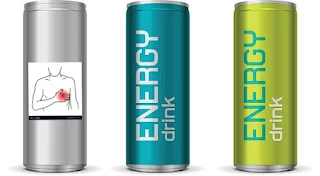Taking a pleasant drink that increases mental alertness, energy, and physical performance sounds wonderful to people in need of a pick-me-up. While consuming an energy drink can give you a bit extra pep in your step, it can also cause you to experience some unpleasant side effects.
What are energy drinks?
Energy drinks, as the name implies, are beverages that are designed to provide you with extra energy. These simple concoctions are laden with stimulants that are proven to support variables like energy levels and mental focus. They are made with substances like taurine, ginseng, and sugar. As a result, in the United States, these drinks are categorized as dietary supplements and are thus not strictly regulated.
Foods That Boost Metabolism.
But caffeine, a stimulant that can make people feel more active, is the star of the energy drink show. These beverages can contain a lot of caffeine—50 to 505 mg per serving, on average. To put this into perspective, a typical cup of coffee has about 100 mg of caffeine, a cup of black tea has 30 mg, and a can of ordinary soda has 34 mg. Here's How Much Caffeine Is Too Much Caffeine, Exactly (Related)
There are many different options for energy drinks. When choosing their ideal concoction, consumers have no shortage of options, from sugar-free to a B-vitamin boost.
Effects of Excessive Caffeine
If you've tried to kick your caffeine habit, you are aware that consuming too much caffeine can have several adverse effects. Caffeine overdose side effects include:
heart palpitations, Insomnia, higher heart rate, elevated blood pressure, Dehydration, Restlessness, etc.
Withdrawal symptoms from caffeine include headache, severe exhaustion, anxiety, trembling, and irritability.
Other ingredients said to boost energy in energy drinks include taurine, ginseng, vitamin B, carnitine, and bitter orange. However, according to our research, these compounds have not undergone adequate testing. Unfortunately, the safety and effects of using these compounds daily are not well recognized.
What Are the Consequences of Energy Drinks?
As the attractiveness of energy drinks grows, so does the number of negative side effects linked with their consumption. Energy drinks are not regulated, and many producers do not test their drinks in scientific trials like other beverages, thus some adverse effects may not be immediately apparent.
While the adverse effects of energy drinks may be minor in young adults, they can be severe in others, posing health dangers.
1. Heart Palpitations.
Energy drinks have been linked to increased heart rate, palpitations, and fast heartbeat. This is more common in people who use a lot of caffeine but are otherwise healthy.
2. Personally Irritated and Anxious.
Numerous studies have connected the usage of energy drinks to negative side effects such as anxiety, impatience, and heart palpitations.
Caffeine in energy drinks can make anxiety and irritation worse for people who already have these conditions. Discuss measures to minimize the severity of the symptoms with your doctor if you struggle with anxiety or irritability.
Caffeine is a stimulant that helps you feel more awake, but it also raises cortisol, circulates Epi and NE, elevates free fatty acids, and changes blood pressure and heart rate in humans, as well as your breathing patterns. Energy drinks are advised for moderation by those who struggle with anxiety or impatience.
3. Vertigo and nausea.
Caffeine users who experience nausea or dizziness after drinking it are advised to reduce their intake. Caffeine stimulates the central nervous system and can dehydrate you by acting as a diuretic. You run a higher risk of unintentional dehydration if you drink energy drinks.
4. Hepatitis and liver damage.
While excessive alcohol consumption frequently results in liver damage, several energy drinks can also harm the liver.
The amount of caffeine in energy drinks is currently unregulated and does not meet any requirements. This means that the amount of caffeine in various energy drinks might vary greatly. As a result, determining how much caffeine is too much for you is difficult. While some individuals can consume small amounts of caffeine without experiencing any side effects, others may experience significant side effects.
Before drinking a drink, it is critical to read the label and understand how much caffeine and other components are included.
5. Excessive usage of energy.
Regular energizing beverage After drinking an energy drink, consumers may experience an "energy high." This can extend from a few hours to a few days as your body flushes it out of your system.
Energy drinks are not regulated in the same way that coffee and other beverages are. Caffeine levels in energy drinks can vary widely because they are unregulated. While one beverage may contain little caffeine, another may contain a lot.
If you drink energy drinks often but don't feel like you have enough energy, you may be taking too much caffeine.
6. Feeling foggy-headed.
Caffeine consumption in excess can have negative health impacts on the brain function. Caffeine is a diuretic, which forces your body to flush sodium and water through your kidneys, leading to headaches and other dehydration-related side effects.
Too much coffee might make you feel foggy-headed and make it difficult to concentrate. Because some people are much more sensitive to the adverse effects of caffeine than others, it is critical to exercise caution and restrict your intake.
Caffeine overdose can cause brain fog symptoms such as headaches, difficulty concentrating, and a lack of motivation.
7. Epileptic convulsions.
Caffeine, the most potent stimulant included in energy drinks, can make epileptics' seizures worse. When paired with caffeine, some epilepsy drugs can make attacks more likely.
Limiting caffeine intake when taking medicine to treat epilepsy is crucial because it can make seizures worse. Avoiding big caffeinated drinks is crucial if you have epilepsy and use energy drinks. Energy drinks, lattes, and speciality coffee drinks are examples of large caffeinated beverages.



.jpg)

